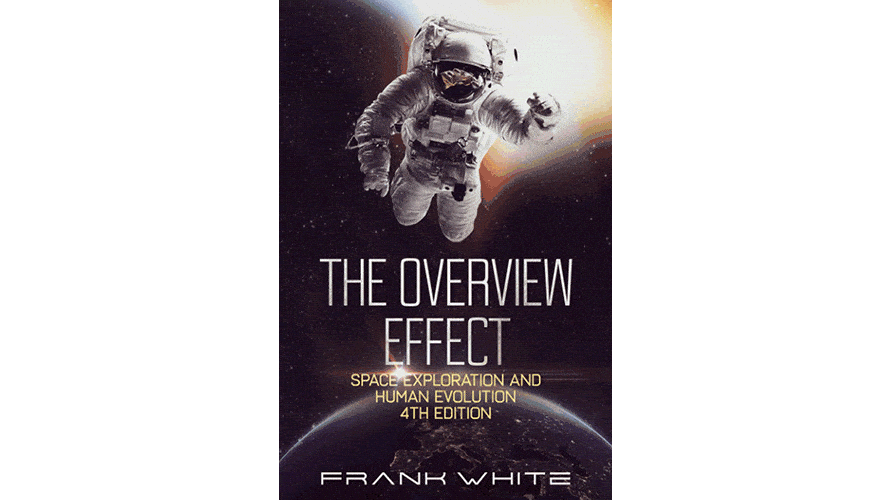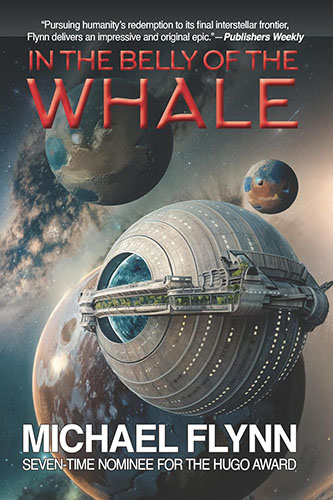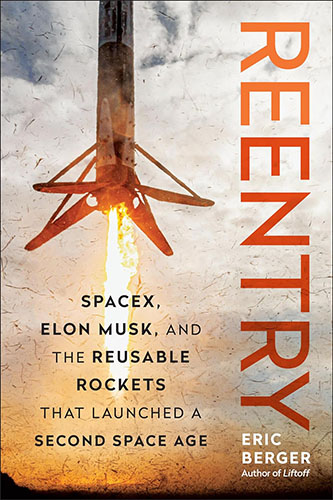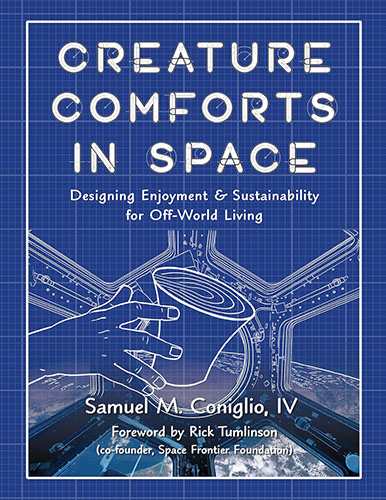Category: Nonfiction
Reviewed by: Loretta Hall
Title: The Overview Effect: Space Exploration and Human Evolution, 4th Edition
Author: Frank White
NSS Amazon link for this book
Format: Paperback, Kindle
Pages: 628 pages
Publisher: Independently published
Date: April 2021
Retail Price: $24.95/$9.99
ISBN: 979-8735748458
Reading The Overview Effect is an exercise in mind expansion. Not only does author Frank White invite us to visualize the Earth from the vantage point of space (the Overview), but he challenges us to envision (in our mind’s eye) our home planet as an integral part of the solar system (the “Copernican Perspective”) and even as an element of the entire universe (the “Universal Insight”).
At first glance, picturing those images seems simple. We have all seen pictures of the Earth from the ISS and even from the Moon. We have seen those beautiful images from the Hubble Space Telescope and know, intellectually, that our planet is a speck orbiting a tiny dot. But White puts those abstract images into perspective in terms of humanity, its social and political expressions, and its evolutionary future.
In particular, he separates the familiar title phrase (which he coined in the early 1980s) into its components: the Overview and the Effect. We can experience seeing the Earth from a distance directly, as an astronaut, or indirectly by reading astronauts’ descriptions and examining photographs. But the Effect comes when we contemplate that vision and respond viscerally to the profound experience. White believes that seeing the Earth from a different physical perspective (from space) produces a different philosophical point of view that can benefit human society. “I have come to see space exploration as part of a long tradition of central projects,” he writes, adding that “central projects, such as the construction of the Gothic cathedrals and the Egyptian pyramids, are catalysts for social and personal transformation.”
In the first third of his book, White massages readers’ minds, stretching their capacity to comprehend the human ramifications of that perspective. A powerful analogy he refers to at various times is to imagine the first evolutionary step of a fish venturing forth onto dry land. “If you were a fish, you would have no idea what land was like,” he writes, “and only the vaguest notion of what water was like, because water would be the immersive medium in which you lived. The idea of ‘sky’ would be far beyond your comprehension.” So it is when humans venture into space.
White bolsters his own indirect perception of the Overview Effect with quotes from numerous astronauts who have directly experienced both the view and the profound effect it produces. Without exception, they report feeling a stronger, more protective connection with the Earth and a deepened awareness of the commonality of all human beings. The borders between countries disappear in the view from space; and the differences of cultures, politics, and competing religions disappear along with them. As more people experience the Overview Effect, directly or indirectly, White says, “[w]e would hope to see people become more interested in preserving the environment, preventing war, and fostering other life-sustaining endeavors.”
The new opportunities of commercial spaceflight mean that more people will have a chance to glimpse the Earth from outside, however briefly. And White’s own writings and his work with the Overview Institute are bringing an understanding of these insights indirectly to an increasing number of people. Descriptions of both the view and the effect, delivered by those who have personally experienced it are important to that effort. To that end, White devotes a large portion of this book to interviews with more than 50 astronauts. These interviews go deeper than the usual “what did you do in space,” delving instead into “what was your experience of seeing the Earth as an isolated entity in the vast realm of the universe?”
I found The Overview Effect fascinating. White has been promoting his theory about its effect on humanity for four decades, through four editions of this book. The title term has become a familiar part of the language about spaceflight, and reading this book greatly increased my understanding of its meaning and importance. I just wish the book had contained an index, as I sometimes wanted to refer back to a previous mention of a term or locate a comment attributed to a particular astronaut.
© 2022 Loretta Hall
Please use the NSS Amazon Link for all your book and other purchases. It helps NSS and does not cost you a cent! Bookmark this link for ALL your Amazon shopping!




















